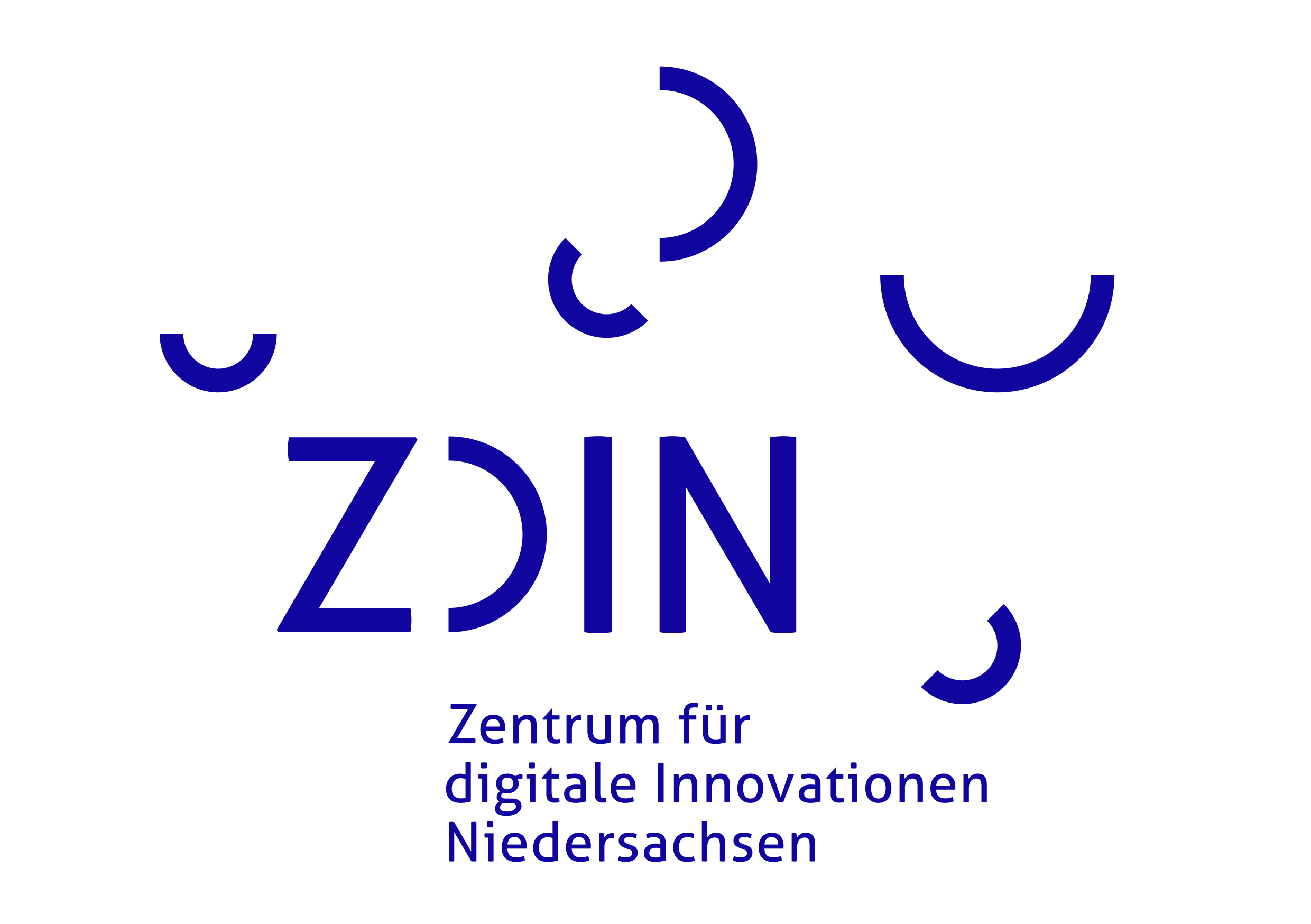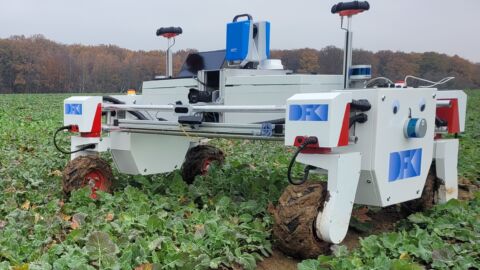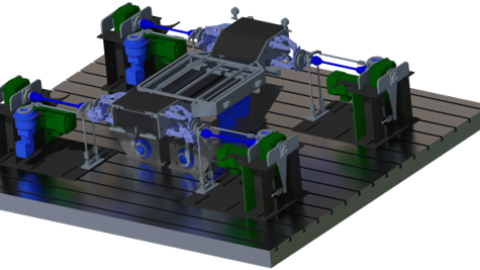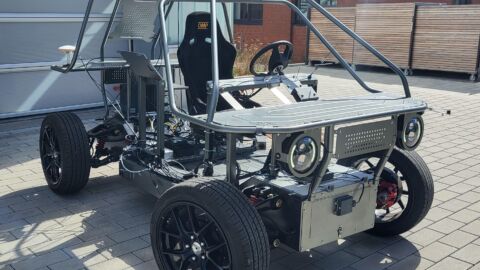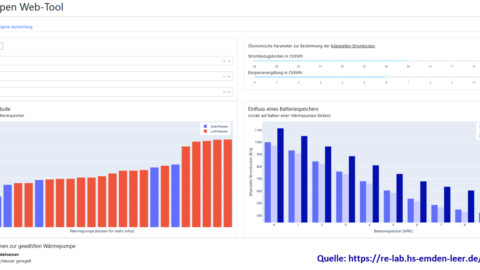ZDIN-Zahlen im Detail
Das umfangreiche ZDIN-Netzwerk aus Wissenschaft und Wirtschaft spannt sich über ganz Niedersachsen. Gemeinsam verzeichnen die Zukunftslabore und die Koordinierungsstelle beeindruckende Projekterfolge, die auf dieser Seite im Detail vorgestellt werden.
Wissenschaftliche Veröffentlichungen
In this paper, a new method is proposed to detect traffic regulations at intersections using GPS traces. The knowledge of traffic rules for regulated locations can help various location-based applicat ...
In this paper, a new method is proposed to detect traffic regulations at intersections using GPS traces. The knowledge of traffic rules for regulated locations can help various location-based applications in the context of Smart Cities, such as the accurate estimation of travel time and fuel consumption from a starting point to a destination. Traffic regulations as map features, however, are surprisingly still largely absent from maps, although they do affect traffic flow which, in turn, affects vehicle idling time at intersections, fuel consumption, CO2 emissions, and arrival time. In addition, mapping them using surveying equipment is costly and any update process has severe time constraints. This fact is precisely the motivation for this study. Therefore, its objective is to propose an automatic, fast, scalable, and inexpensive way to identify the type of intersection control (e.g., traffic lights, stop signs). A new method based on summarizing the collective behavior of vehicle crossing intersections is proposed. A modification of a well-known clustering algorithm is used to detect stopping and deceleration episodes. These episodes are then used to categorize vehicle crossing of intersections into four possible traffic categories (p1: free flow, p2: deceleration without stopping events, p3: only one stopping event, p4: more than one stopping event). The percentages of crossings of each class per intersection arm, together with other speed/stop/deceleration features, extracted from trajectories, are then used as features to classify the intersection arms according to their traffic control type (dynamic model). The classification results of the dynamic model are compared with those of the static model, where the classification features are extracted from OpenStreetMap. Finally, a hybrid model is also tested, where a combination of dynamic and static features is used, which outperforms the other two models. For each of the three models, two variants of the feature vector are tested: one where only features associated with a single intersection arm are used (one-arm model) and another where features also from neighboring intersection arms of the same intersection are used to classify an arm (all-arm model). The methodology was tested on three datasets and the results show that all-arm models perform better than single-arm models with an accuracy of 95% to 97%.
Autor*innen
- Prof. Dr.-Ing. habil. Monika Sester (Leibniz Universität Hannover)
- Stefania Zourlidou (Leibniz Universität Hannover)
Veröffentlichung
- Im Rahmen des Buches/Journals bzw. Konferenz: ISPRS International Journal of Geo-Information, 12(1), 4.
- Datum: 23.12.2022
- Link zur Veröffentlichung
With rising electricity demand through digitization and innovation, the urgency of climate change mitigation, and the recent geopolitical crisis, stakeholders in developing countries face the complex ...
With rising electricity demand through digitization and innovation, the urgency of climate change mitigation, and the recent geopolitical crisis, stakeholders in developing countries face the complex task to build reliable, affordable, and low-emission energy systems. Information inaccessibility, data unavailability, and scarce local expertise are major challenges for planning and transitioning to decentralized solutions. Motivated by the calls for more solution-oriented research regarding sustainability, we design, develop, and evaluate the web-based decision support system NESSI4Dweb+ that is tailored to the needs and capabilities of various stakeholders in developing countries. NESSI4Dweb+ is open access and considers location-specific circumstances to facilitate multi-energy planning. Its applicability is demonstrated with a case study of a representative rural village in southern Madagascar and evaluated through seven interviews with experts and stakeholders. We show that NESSI4Dweb+ can support the achievement of the United Nations Sustainable Development Goals and enable the very prerequisite of digitization: reliable electrification.
Autor*innen
- M. Sc. Maria Hart (Leibniz Universität Hannover, Institut für Wirtschaftsinformatik)
- Prof. Dr. rer. nat. habil. Michael H. Breitner (Leibniz Universität Hannover, Institut für Wirtschaftsinformatik)
Veröffentlichung
- Im Rahmen des Buches/Journals bzw. Konferenz: Energy Informatics
- Datum: 20.12.2022
- Link zur Veröffentlichung
Voice commerce creates unprecedented opportunities for consumers and vendor firms to interact, engage, and relate. With artificial intelligence–powered voice assistants, consumers can make technolo ...
Voice commerce creates unprecedented opportunities for consumers and vendor firms to interact, engage, and relate. With artificial intelligence–powered voice assistants, consumers can make technology-mediated purchases without using their tactile senses, which represents a new space for commercial interactions. Drawing on the customer journey as an organizing framework, this article proposes a structured research agenda, in an attempt to shed light on the bright side effects of voice commerce while also acknowledging concerns for consumer protection and society in general. Voice assistants can enhance every stage of the purchase journey, yet their use might have negative consequences for customer relationships. In the prepurchase stage, voice assistants can act as information curators or manipulators. In the purchase stage, voice assistants can adopt roles as shopping concierges or impediments. In the postpurchase and usage stage, voice assistants can become trusted relationship partners or hostile intruders in consumers’ lives.
Autor*innen
- Prof. Dr. David Woisetschläger (Technische Universität Braunschweig, Institut für Automobilwirtschaft und Industrielle Produktion)
Veröffentlichung
- Im Rahmen des Buches/Journals bzw. Konferenz: SMR-Journal of Service Management Research, 6(4), 216-231.
- Datum: 19.12.2022
- Link zur Veröffentlichung
For the investigation of major traffic accidents, larger vessels are obliged to install a voyage data recorder (VDR). However, not every vessel is equipped with a VDR, and the readout is often a manua ...
For the investigation of major traffic accidents, larger vessels are obliged to install a voyage data recorder (VDR). However, not every vessel is equipped with a VDR, and the readout is often a manual process that is costly. In addition, not only ship-related information can be relevant for reconstructing traffic accidents, but also information from other entities such as meteorological services or port operators. Moreover, another major challenge is that entities tend to trust only their records, and not those of others as these could be manipulated in favor of the particular recording entity (e.g., to disguise any damage caused). This paper presents an approach to documenting arbitrary data from different entities in a trustworthy, decentralized, and tamper-proof manner to support the conflict resolution process. For this purpose, all involved entities in a traffic situation can contribute to the documentation by persisting their available data. Since maritime stakeholders are equipped with various sensors, a diverse and meaningful data foundation can be aggregated. The data is then signed by a mutually agreed upon timestamping authority (TSA). In this way, everyone can cryptographically verify whether the data has been subsequently changed. This approach was successfully applied in practice by documenting a vessel’s mooring maneuver.
Autor*innen
- Prof. Dr.-Ing. Axel Hahn (Deutsches Zentrum für Luft- und Raumfahrt (DLR))
- Dennis Jankowski (Deutsches Zentrum für Luft- und Raumfahrt (DLR))
- Hilko Wiards (Deutsches Zentrum für Luft- und Raumfahrt (DLR))
- Julius Möller (Deutsches Zentrum für Luft- und Raumfahrt (DLR))
Veröffentlichung
- Im Rahmen des Buches/Journals bzw. Konferenz: Journal of Marine Science and Engineering
- Datum: 16.12.2022
- Link zur Veröffentlichung
The term ”Agriculture 4.0” emerged from the term “Industry 4.0” like amany other “4.0” terms. However, are Industry 4.0 technologies and concepts really applicable to agriculture? Are the benefits tha ...
The term ”Agriculture 4.0” emerged from the term “Industry 4.0” like amany other “4.0” terms. However, are Industry 4.0 technologies and concepts really applicable to agriculture? Are the benefits that Industry 4.0 brings to industrial use cases transferable to livestock farming? This paper tries to answer this question for the three dominant sectors of livestock farming in Central Europe and Germany: Poultry, pig fattening, and dairy farming. These sectors are analyzed along with the eight most relevant Industry 4.0 benefits. The results show that only part of the Industry 4.0 benefits are relevant for livestock farming in a similar manner as in industrial production. Due to basic differences between industrial and livestock farming use cases, some of the benefits must be adapted. The presence of individual living animals and the strong environmental impact of livestock farming affect the role of digital individualization and demand orientation. The position of livestock farming within the value chain minimizes the need for flexibilization. The introduction and adoption of Industry 4.0 concepts and technologies may contribute significantly to transforming agriculture into something that may be called Agriculture 4.0. Technologies are indispensable for this development step, but vocational education and open-mindedness of farmers towards Industry 4.0 is essential as well.
Autor*innen
- Dipl.-Inform. Martin Kraft (Thünen-Institut, Institut für Agrartechnologie)
- Kathrin Toppel (Hochschule Osnabrück)
- Prof. Dr. Heinz Bernhardt (Technische Universität München)
- Prof. Dr. habil. Reiner Brunsch (Leibniz-Institut für Agrartechnik und Bioökonomie e.V. (ATB))
- Martin Ziron (Fachhochschule Südwestfalen)
- Prof. Dr. Clemens Westerkamp (Hochschule Osnabrück)
- Prof. Dr. Heiko Tapken (Hochschule Osnabrück)
- Prof. Dr. Johannes Marquering (Jade Hochschule - Wilhelmshaven Oldenburg Elsfleth)
- Henri Graf (Hochschule Osnabrück)
- Dipl.Ing. Eduardo Colangeo (Fraunhofer - Institut für Produktionstechnik und Automatisierung IPA)
- Prof. Dr. Wolfgang Büscher (Institut für Landtechnik)
Veröffentlichung
- Im Rahmen des Buches/Journals bzw. Konferenz: Applied Science
- Datum: 14.12.2022
- Link zur Veröffentlichung
Wissenschaftliche Vorträge
Referent*innen
Vortrag
- Im Rahmen der Veranstaltung: 43. International Conference on Information Systems
- Datum: 12.12.2022
Referent*innen
- Prof. Dr. Martin Fränzle (Carl von Ossietzky Universität Oldenburg, Department für Informatik)
Vortrag
- Im Rahmen der Veranstaltung: Workshop Trustworthy Autonomous Systems, DLR Oldenburg
- Datum: 01.12.2022
Referent*innen
- Dr. Martin Kuhlmann (Georg-August-Universität Göttingen, Soziologisches Forschungsinstitut Göttingen)
Vortrag
- Im Rahmen der Veranstaltung: Vortrag im Rahmen der Wissenschaftskonferenz "Technikfolgenabschätzung aus Arbeitnehmer:innen-Perspektive" der Arbeiterkammer Vorarlberg, Schaffarei, Feldkirch (Österreich)
- Datum: 24.11.2022
Referent*innen
- Dr. Arne Ortland (Universität Vechta, Fakultät I, Wirtschaft und Ethik)
Vortrag
- Im Rahmen der Veranstaltung: CENTERIS – International Conference on ENTERprise Information Systems
- Datum: 11.11.2022
Referent*innen
- Prof. Dr.-Ing. Karl-Heinz Niemann (Hochschule Hannover, Fakultät 1: Elektro- und Informationstechnik)
Vortrag
- Im Rahmen der Veranstaltung: Jahressitzung der Interessengemeinschaft Automatisierungstechnik in der Prozessindustrie (NAMUR)
- Datum: 10.11.2022
Außerwissenschaftliche Beiträge
Referent*innen
- Prof. Dr.-Ing. Lars Kühl (Ostfalia Hochschule für angewandte Wissenschaften, Institut für Energieoptimierte Systeme (EOS))
Beitrag
- Anlass: WOW! Pop up Veranstaltung
- Datum: 15.12.2022 - 15.12.2022
Referent*innen
- Jens Hüsers (Hochschule Osnabrück)
Beitrag
- Anlass: Tagung: Digitale Kompetenztransformation im Gesundheitswesen
- Datum: 14.12.2022
Referent*innen
- Prof. Dr. Jantje Halberstadt (Universität Vechta, Institut für Strukturforschung und Planung in agrarischen Intensivgebieten)
- Dr. Anne-Kathrin Schwab (Universität Vechta)
- Dr. Olaf Katenkamp (Universität Vechta, Fakultät I, Wirtschaft und Ethik)
- Dr. Arne Ortland (Universität Vechta, Fakultät I, Wirtschaft und Ethik)
Beitrag
- Anlass: 7. Forschungsfördertag der Universität Vechta
- Datum: 01.12.2022 - 01.12.2022
Referent*innen
- Prof. Dr.-Ing. habil. Monika Sester (Leibniz Universität Hannover)
Beitrag
- Anlass: Symposium Datenvisualisierungen – Werkzeuge der Erkenntnisse; Hochschule Hannover.
- Datum: 24.11.2022 - 24.11.2022
Referent*innen
- Anna Louisa Reimers (Hochschule Osnabrück, Fakultät Agrarwissenschaften und Landschaftsarchitektur)
- Ida Krüwel (Hochschule Osnabrück, Fakultät Agrarwissenschaften und Landschaftsarchitektur)
- Dr. Lea Jacobsen (Hochschule Osnabrück)
- Prof. Dr. Robby Andersson (Hochschule Osnabrück, Lehrstuhl Tierhaltung und Produkte)
Beitrag
- Anlass: DLG Forum Geflügel, EuroTier, Hannover
- Datum: 18.11.2022 - 18.11.2022
Messebeiträge
Das Zukunftslabor Gesundheit hat beim Digitalgipfel 2022 in Hannover teilgenommen. Die Veranstaltung stand unter dem Titel "Bessere Medizin durch Künstliche Intelligenz (KI)". Im Rahmen der Veranstaltung hat das ZLG mit den Demonstratoren "Physiotherapie-App", sowie den beiden Online-Kursen "Das lernende Gesundheitswesen - So lernt es" und "Patientennahe Sensorsysteme in der Pflege". Die Anwesenden konnten sich am Stand des ZLG die Kurse anschauen und die Physiotherapie-App ausprobieren.
Beteiligte ZDIN-Einrichtungen
- HAWK Hochschule für angewandte Wissenschaft und Kunst Hildesheim/Holzminden/Göttingen
- Hochschule Hannover
- Universitätsmedizin Göttingen
Beitrag
- Art des Beitrags: Demonstratoren
- Datum: 30.11.2022
- Ort: Hannover
Unsere Fakultät stellte das kamerabasierte Digitale Assistenzsystem ifm-Mate zur Unterstützung in der Kommissionierung vor. Das System wird unter anderem innerhalb unseres Forschungsprojektes „Digitales Assistenzsystem für Lagerprozesse in KMU“ unter der Leitung von Frau Prof. Dr. Wegner genutzt und steht unseren Studierenden im Logistiklabor in Suderburg zur Verfügung.
Beteiligte ZDIN-Einrichtungen
- Ostfalia Hochschule für angewandte Wissenschaften
Beitrag
- Art des Beitrags: Exponat
- Datum: 14.09.2022
- Ort: TIP Nordheide
Das Exponat veranschaulichte die Herausforderungen an industrielle Steuersysteme in mobilen Szenarien, insbesondere die drahtlose Kommunikation betreffend. Es wurde ferner gezeigt, wie auch anspruchsvolle Steueralgorithmen wie z. B. KI durch dedizierte Beschleuniger in energiebeschränkte mobile Steuerplattformen integriert werden können, um auch im Falle von unterbrochener drahtloser Kommunikation eine hinreichende Grundfunktionalität sicherstellen zu können. Aus dem Zukunftslabors Produktion floss hierbei die systematische Modellierung und Absicherung von Kommunikation ein, sowie die heterogene Modellierung von Steuerprogrammen mit Integration von Spezialbeschleunigern.
Beteiligte ZDIN-Einrichtungen
- OFFIS Institut für Informatik
- FuE-Bereich Produktion
Beitrag
- Art des Beitrags: Exponat
- Datum: 14.09.2022
- Ort: Buchholz
Im Rahmen der Techtide 2022 haben die Zukunftslabore Energie, Gesundheit und Produktion an einer Podiumsdiskussion teilgenommen. Diskutiert wurde über das Thema "Digitale Transparenz stärken - mit KI", mit Einblicken aus den Schwerpunkten der vertretenden Zukunftslabore.
Beteiligte ZDIN-Einrichtungen
- Carl von Ossietzky Universität Oldenburg
Beitrag
- Art des Beitrags: Podiumsdiskussion
- Datum: 13.09.2022
- Ort: Hannover
Prof. Dr. Sebastian Lehnhoff (Carl von Ossietzky Universität | OFFIS – Institut für Informatik) nahm neben weiteren Teilnehmer*innen an der Podiumsdiskussion zum Thema "Digitale Transparenz stärken – mit KI! Beispiele aus der Energie-, Gesundheits- und Produktionsbranche" teil.
Beteiligte ZDIN-Einrichtungen
- OFFIS Institut für Informatik
- FuE-Bereich Energie
Beitrag
- Art des Beitrags: Podiumsdiskussion
- Datum: 13.09.2022
- Ort: Hannover
Technologiedemonstratoren
Transfer-Workshops
CRF 3-Runde: Ausarbeitung und Anpassung der vorgenommenen Trendanalyse - Berücksichtigung der intermodalen Logistik
Workshop
- Datum: 20.12.2022
- Ort: online
Gemeinsam mit den Partnern des Netzwerk Versorgungskontinuität Osnabrück und dem Gesundheitscampus hat die Hochschule eine Tagung veranstaltet, in der u.a. die Ergebnisse des ZLG TP3 (Demonstrator 2) vorgestellt und diskutiert wurden. Dabei ging es insbesondere um die Nutzung von Fortbildungsangeboten in der Gesundheitsversorgung, bei dem der Demonstrator 2 (Curriculum und Kurs Data Analytics Health Care) eingesetzt werden kann.
Workshop
- Datum: 14.12.2022
- Ort: Osnabrück
Workshop zum Thema Fuhrparkumstellung (Elektromobilität) und Ladeinfrastruktur am Unternehmensstandort unter Einbeziehung von Expertenvorträgen. Als Ergebnis lag eine aktuelle Darstellung von verschiedenen Situationen in Bezug auf die Ladeinfrastruktur am Unternehmensstandort vor. Auf Basis der Informationen und Überlegungen können Szenarien zur Sicherstellung von Lademöglichkeiten erarbeitet werden.
Workshop
- Datum: 08.12.2022
- Ort: Zoom
Die durchgeführte Trendanalyse wurde im Rahmen des Zukunftslabors weiter ausgearbeitet, analysiert und angepasst. Als Ergebnis liegt die nutzbare Trendanalyse vor, die bspw. im Rahmen der Logistik-Szenarien zum Einsatz kommt. Auch im Kontext der Zukunftsszenarien kann die Trendanalyse Anwendung finden.
Workshop
- Datum: 30.11.2022
- Ort: online
Zusammen mit HS Osnabrück: Anpassung der Logistik-Szenarien unter Berücksichtigung der Ergebenisse der Trendanalyse
Workshop
- Datum: 28.11.2022
- Ort: online
Fort- und Weiterbildungen
- Prof. Dr. David Woisetschläger (Technische Universität Braunschweig, Institut für Automobilwirtschaft und Industrielle Produktion)
- Angebotsart: Seminar
- Datum: 27.10.2022 - 31.03.2023
- Prof. Dr. Andreas Bernard (Leuphana Universität Lüneburg, Institut für Kultur und Ästhetik digitaler Medien)
- Angebotsart: Seminar
- Datum: 10.10.2022
- Prof. Dr.-Ing. Marcus Seifert (Science to Business GmbH - Hochschule Osnabrück Institut für Produktion und Logistik - LOGIS.NET)
- Angebotsart: Seminar
- Datum: 21.09.2022
- M. Sc. Hendrik Noske (Leibniz Universität Hannover)
- Angebotsart: Sonstiges
- Datum: 07.07.2022
- Prof. Dr.-Ing. Marcus Baum (Georg-August-Universität Göttingen, Institut für Informatik)
- Angebotsart: Sonstiges
- Datum: 05.06.2022
Studienabschlussarbeiten
- M.Sc. Kathrin Kramer (Leuphana Universität Lüneburg)
- Art: Bachelor
- Themencluster: Produktionsplanung und -steuerung
- Datum: 22.12.2022 - 15.04.2023
- Prof. Dr. Martin Fränzle (Carl von Ossietzky Universität Oldenburg, Department für Informatik)
- Art: Master
- Themencluster: Künstliche Intelligenz
- Datum: 18.12.2022 - 27.09.2023
- Prof. Dr. Sebastian Lehnhoff (Carl von Ossietzky Universität Oldenburg, Abteilung Energieinformatik)
- Art: Master
- Themencluster: Modellierung und Simulation
- Datum: 16.12.2022
- Prof. Dr.-Ing. Andreas Hein (Carl von Ossietzky Universität Oldenburg, Abteilung Assistenzsysteme und Medizintechnik, OFFIS Institut für Informatik, FuE-Bereich Gesundheit)
- Art: Bachelor
- Themencluster: Datenmanagement und -analyse
- Datum: 15.12.2022 - 04.05.2023
- Anna Louisa Reimers (Hochschule Osnabrück, Fakultät Agrarwissenschaften und Landschaftsarchitektur)
- Prof. Dr. Robby Andersson (Hochschule Osnabrück, Lehrstuhl Tierhaltung und Produkte)
- Art: Bachelor
- Themencluster: Prozessoptimierung
- Datum: 12.12.2022 - 03.03.2023

